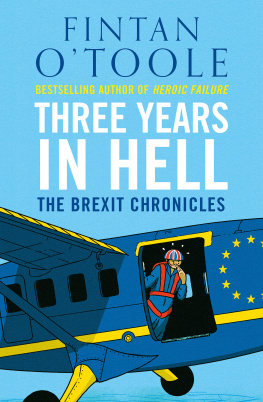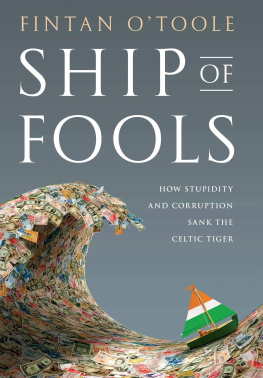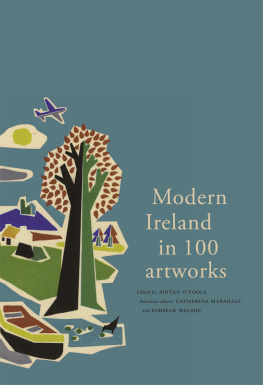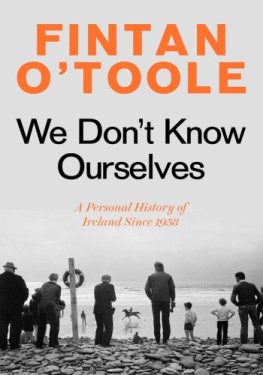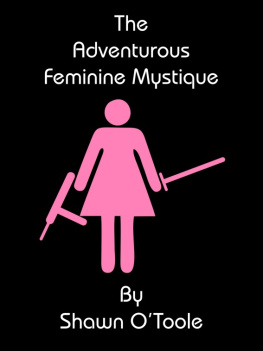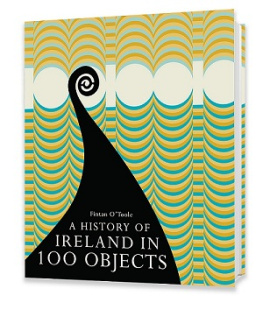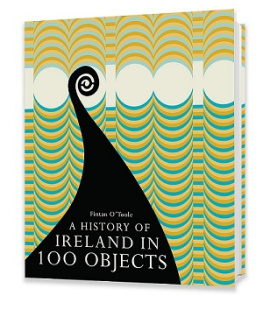Fintan OToole - Three Years in Hell
Here you can read online Fintan OToole - Three Years in Hell full text of the book (entire story) in english for free. Download pdf and epub, get meaning, cover and reviews about this ebook. year: 2020, publisher: Apollo, genre: Politics. Description of the work, (preface) as well as reviews are available. Best literature library LitArk.com created for fans of good reading and offers a wide selection of genres:
Romance novel
Science fiction
Adventure
Detective
Science
History
Home and family
Prose
Art
Politics
Computer
Non-fiction
Religion
Business
Children
Humor
Choose a favorite category and find really read worthwhile books. Enjoy immersion in the world of imagination, feel the emotions of the characters or learn something new for yourself, make an fascinating discovery.
- Book:Three Years in Hell
- Author:
- Publisher:Apollo
- Genre:
- Year:2020
- Rating:5 / 5
- Favourites:Add to favourites
- Your mark:
- 100
- 1
- 2
- 3
- 4
- 5
Three Years in Hell: summary, description and annotation
We offer to read an annotation, description, summary or preface (depends on what the author of the book "Three Years in Hell" wrote himself). If you haven't found the necessary information about the book — write in the comments, we will try to find it.
Three Years in Hell — read online for free the complete book (whole text) full work
Below is the text of the book, divided by pages. System saving the place of the last page read, allows you to conveniently read the book "Three Years in Hell" online for free, without having to search again every time where you left off. Put a bookmark, and you can go to the page where you finished reading at any time.
Font size:
Interval:
Bookmark:

THREE
YEARS
IN HELL
Meanwhile Back at the Ranch
White Savage
A Traitors Kiss
Ship of Fools
Enough is Enough
Judging Shaw
Heroic Failure
FINTAN
OTOOLE
THREE
YEARS
IN HELL
AN APOLLO BOOK
www.headofzeus.com
This is an Apollo book, first published in the UK in 2020 by Head of Zeus Ltd
Copyright Fintan OToole, 2020
The moral right of Fintan OToole to be identified as the author of this work has been asserted in accordance with the Copyright, Designs and Patents Act of 1988.
All rights reserved. No part of this publication may be reproduced, stored in a retrieval system, or transmitted in any form or by any means, electronic, mechanical, photocopying, recording, or otherwise, without the prior permission of both the copyright owner and the above publisher of this book.
A catalogue record for this book is available from the British Library.
ISBN (HB): 9781838937836
ISBN (XTPB): 9781838935207
ISBN (E): 9781838935221
Cover Designer: R. Fresson
Head of Zeus Ltd
58 Hardwick Street
London EC 1 R 4 RG
WWW . HEADOFZEUS . COM
In memory of Mary OToole Byrne (19612019)
I have been sometimes thinking, if a man had the art of second sight for seeing lies how admirably he might entertain himself in this town, by observing the different shapes, sizes, and colours of those swarms of lies which buzz about the heads of some people like flies about a horses ears in summer.
JONATHAN SWIFT , The Art of Political Lying,
The Examiner , November 1710
Early in the morning of 13 December 2019, Boris Johnson made his victory speech. He had used the simple thirteen-letter slogan Get Brexit Done to transform the electoral map. Parts of the English Midlands and North where people used to think the official name of Johnsons party was Tory Scum had abandoned generations of loyalty to Labour and voted Conservative. Johnson had been given a parliamentary majority comfortable enough to ensure that he would, albeit in a very limited sense, get Brexit done. The United Kingdom would formally cease to be a member of the European Union on 31 January 2020. Something was certainly coming to an end. It was just not entirely clear what that something was.
Speaking at what he bathetically called this glorious, glorious pre-breakfast moment (food is never far from his mind) Johnson could not contain his sense of wonder. He had managed, as he put it, to unite the nation from Woking to Workington; from Kensington to Clwyd South; from Surrey Heath to Sedgefield; from Wimbledon to Wolverhampton. Johnson can never resist an alliterative litany and this list of new and old Tory heartlands was no doubt shaped by the demands of his favourite rhetorical device. Yet in his euphoria he seems not to have noticed that seven of the eight constituencies he namechecked are in England. He could have achieved the same assonance with from Dumfries [in Scotland] to Don Valley or from Brecon [in Wales] to Bolsover, an eternal Labour seat in the English Midlands that had miraculously passed to the Tories. But he didnt.
Johnson had, in a real sense, created a new country. Ever since Elizabeth Gaskells classic novel of 1854, North and South , it has been a commonplace to speak and write of the two parts of England as if they were different countries. In the novel, the Hales, father and daughter, are to move from Helstone in the South to Milton in the North. Mr Hale explains to Margaret that in this move they would encounter people and scenes so different that I shall never be reminded of Helstone. Margaret reflects: It would be different. Discordant as it was with almost a detestation for all she had ever heard of the North of England, the manufacturers, the people, the wild and bleak country there was this one recommendation it would be different from Helstone, and could never remind them of that beloved place. The language would be the same if the Hales were embarking for Australia or India rather than merely moving a few hundred miles up the road.
Ever since, the notion of North and South as two different countries in everything but name has been a commonplace of English culture, reinforced by tangible differences in the economy, in wages, in educational levels, in political loyalties and even in such English institutions as fish and chips (cod in the South; haddock in the North). In the language of the 2019 general election, the term Red Wall referring to the almost geological bedrock of Labour-voting seats in the North was repeated almost as often as Get Brexit Done. It conjured an image of invasion and repulsion, as if, in addition to the old Roman fortification Hadrians Wall, which roughly defined Englands external boundary with Scotland, there were also this great political barricade running through England itself.
And Johnson completely overran it. He did, up a point, unite Wimbledon, where zero per cent of local districts are defined as highly deprived and Wolverhampton North East, where 27 per cent of them are so defined. The great political power of Brexit always lay in its ability to bring together, in one common gesture of defiance, much of the rich upper class including the dilettante faux aristocracy to which Johnson belongs and much of the white working class. The anti-state anarchism of the hedge fund caste was fused with the anti-Establishment rage of the post-industrial untouchables. Johnson proved in 2019 that the power unleashed when these two wires crossed was undiminished it could burn through long-established political and social identities.
So it is not too much of an exaggeration to say that Johnson had accidentally created a new country. He deserves, perhaps, to be called the father of the nation. The only problem is that neither he nor anyone else knows what this new country is. It is certainly not, as Johnsons triumphant speech acknowledged by omission, the United Kingdom: Scotland and Northern Ireland rejected Brexit even more emphatically in the election of 2019 than they had done in the referendum of 2016 and a clear majority of voters in the UK as a whole voted in 2019 for parties that promised a second referendum and an opportunity to stay in the EU. It is not even, properly speaking, England: it includes much of Wales (Johnson did remember to namecheck Clwyd South) but excludes Greater London which voted emphatically against Johnson and Brexit.
The eerie thing is not just that this new country is nameless but that so, too, is its great unifying cause. The cause is Brexit but Brexit, in Johnsons successful framing of it, is done, over, gone. It has vanished. It happened already and it is not to be spoken of now. The Huffington Post reported shortly after the election that the word Brexit was to be officially removed from public discourse, with the disbandment of the Department for Exiting the European Union and the renaming of the Brexit press team as the Europe and economy unit. The anonymous country would thus have an anonymous national mission to bind it together. This seems an appropriate outcome for a project in which an unacknowledged force (English nationalism) was channelled into an undefined transformation (a Brexit that had no realistic relationship to an achievable reality). While Johnson liked to talk of this pivotal moment in our national story, there was neither a settled nation nor a clear story.
This is the great paradox of the whole saga: Brexit can achieve the impossible; its just the possible it has trouble with. It has done incredible things: shattered deeply rooted identities, united the have-nots with the have-yachts, abolished the political distinction between North and South in England, made Johnson a figure whom almost nobody regards as honest, competent or sincere into one of the most consequential national leaders in English history. But it struggles with the credible ones. Neither before nor after the referendum of June 2016 did its leading proponents come up with any serious plan for what Brexit would really mean in practice for Britains economy, for its place in the world, for its very existence as a unitary state.
Font size:
Interval:
Bookmark:
Similar books «Three Years in Hell»
Look at similar books to Three Years in Hell. We have selected literature similar in name and meaning in the hope of providing readers with more options to find new, interesting, not yet read works.
Discussion, reviews of the book Three Years in Hell and just readers' own opinions. Leave your comments, write what you think about the work, its meaning or the main characters. Specify what exactly you liked and what you didn't like, and why you think so.

